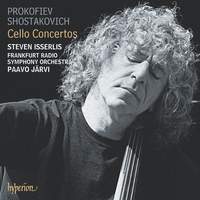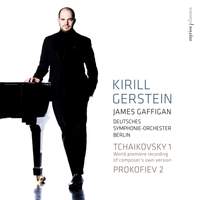Recording of the Week,
Russian Cello and Piano Concertos from Steven Isserlis and Kirill Gerstein
Two discs with a common theme this week – early versions of Russian masterpieces. Many composers have revised their works for innumerable reasons, including (as in this week's two featured discs) musical criticism and political upheaval. These can both be extremely powerful influences on the course of a work, and indeed of a composer's career, and it's fascinating to “unpick” them, peel back the layers and explore musical might-have-beens by uncovering what the work was like before the changes were made.

One famously-criticised work is Tchaikovsky's Piano Concerto No. 1; the young composer approached the pianist Nikolai Rubinstein in an effort to address his own shortcomings as a composer for the piano, and Rubinstein's assessment of the work was scathing. We know that the object of his scorn was an earlier version of the Concerto with subtle, but revealing, differences from the version often heard today (indeed this recording is the world premiere of the composer's original conception of the work). The first of these alterations is obvious right from the opening, and it's amazing how it can set a markedly different tone for the work; those iconic striding D flat major chords by which the soloist aurally and visually stamps their authority on the music are here arpeggiated – so similar on paper, and yet so different to the ear!
Pianist Kirill Gerstein's sleeve-notes – outlining authoritatively the research behind this performance – suggest that the work as originally written is a lighter and more lyrical affair, almost Schumann-like in tone; and his playing matches this. Although in fact the differences from the final version are not vast, Gerstein has taken them as the starting-point for a more philosophical reassessment of the piece as a whole. In his hands (and with sensitive accompaniment from the Deutsches Symphonie-Orchester Berlin under James Gaffigan), the overall feel of the work is changed from a heroic, red-blooded Romanticism, seeming to prefigure turbulent Rachmaninov, to a more introspective vision.
While the Tchaikovsky is clearly “only” a different version of what is fundamentally the same work, the second in this week's double-bill can rightly be termed a distinct work in its own right. Prokofiev's Symphony-Concerto for cello is a well-known and well-loved staple of the concertante repertoire for that instrument, but it's actually a wholesale reworking of an earlier composition – the Cello Concerto, which, through no fault of the composer's, premiered as a resounding failure in 1938. Political and logistical factors combined to make the first performance something of a debacle, and the work's reputation never recovered despite the advocacy of a small number of cellists in Western Europe who recognised its worth.

This is a great shame, as it shows a different side of the composer to the man we hear in the Symphony-Concerto (written over a decade later) – a younger, more headstrong musician who had yet to be beaten into line by the degrading show trials of the 1940s, and who pursued his own musical way with an acerbic disdain for his detractors. The advice of Rostropovich, too, contributed to the writing in the later work, making up for Prokofiev's relative inexperience in composing for the cello. But listening to the combative character of the Concerto I found myself thinking that this less “natural” writing was actually perfectly in the spirit of the work. As Steven Isserlis's erudite notes say (outlining, like Gerstein, the thinking that underpins his musicianship), the “battle lines are drawn” between soloist and orchestra right from the beginning, and this tussling spirit is really palpable – particularly in the middle movement, despite its occasional eruptions into beautiful lyricism. Isserlis wrestles like a cellistic Jacob with a fiendishly difficult and un-rewarding solo part; his victory in the closing bars over his sparring partners, the Frankfurt Radio Symphony Orchestra and their conductor Paavo Järvi, is the culmination of a struggle both heroic and hard-fought!
It's easy to criticise both these works as being sprawling, unrefined sketches crying out for the tough love of a good pruning by the composer – but at the risk of trivialising a long and earnestly-fought philosophical debate about versions and authenticity, I must say that having listened to these two discs I feel strongly that the composer's original intentions are definitely worth listening to, whether or not they changed later. They are valuable not merely as the focus of academic study towards a better understanding of the “finished” products we now know, but as works in their own right; both are fascinating and both soloists have clearly taken pains to get under their skin.
Steven Isserlis (cello), Frankfurt Radio Symphony Orchestra, Paavo Järvi
Available Formats: CD, MP3, FLAC, Hi-Res FLAC
Kirill Gerstein (piano), Deutsches Symphonie-Orchester Berlin, James Gaffigan
Available Formats: SACD, MP3, FLAC, Hi-Res FLAC




